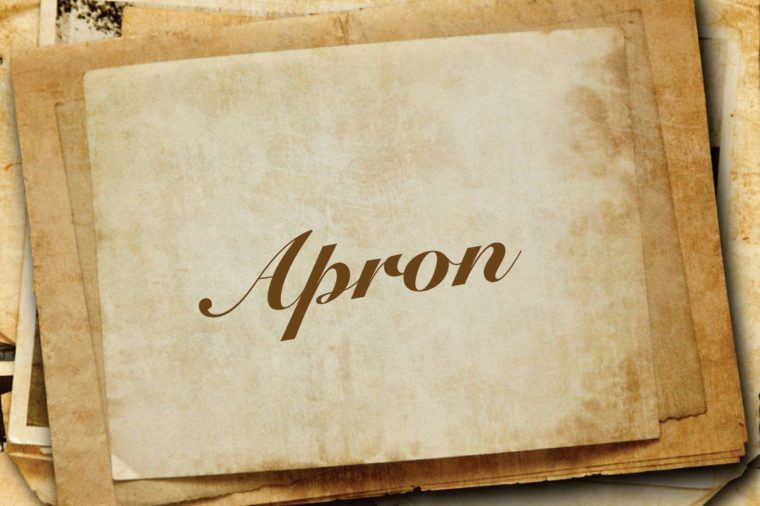15 Real Words That Were Invented by Accident »
The English language is chock-full of words that were born out of errors. Read on to find out which everyday terms started out by mistake.
Apron
 TATIANA AYAZO/RD.COM, SHUTTERSTOCK TATIANA AYAZO/RD.COM, SHUTTERSTOCK
Back in the Middle Ages, the French called this protective cooking gear a naperon. But once English speakers adopted the word, the phrase “a napron” often blended together when people said it out loud. As a result, “a napron” became “an apron,” instead—and we have spelled it that way ever since. Check out more accidental discoveries that changed the world.
Algorithm
 TATIANA AYAZO/RD.COM, SHUTTERSTOCK TATIANA AYAZO/RD.COM, SHUTTERSTOCK
Sneeze
 TATIANA AYAZO/RD.COM, SHUTTERSTOCK TATIANA AYAZO/RD.COM, SHUTTERSTOCK
Believe it or not, sneeze was originally spelled with an F, not an S—as in fneze. Why the change? According to one explanation, people often misread the lowercase f as the old-fashioned long S character, ſ. Eventually, the spelling error simply became the norm. Learn more about the six forgotten letters in the English alphabet.
Squeeze
 TATIANA AYAZO/RD.COM, SHUTTERSTOCK TATIANA AYAZO/RD.COM, SHUTTERSTOCK
In Old English, the term quease meant to press or crush firmly. The extra “s” was mistakenly added later on, probably due to the word’s likeness to other expressions that begin with “squ-,” like squash and squat. You’ll never believe these silly-sounding words are real—but they are.
Pea
 TATIANA AYAZO/RD.COM, SHUTTERSTOCK TATIANA AYAZO/RD.COM, SHUTTERSTOCK
One pea was originally called a pease in Middle English. However, it was often misinterpreted as a plural word, thanks to the last "s" sound. This led scholars to create a singular version of the word, pea, in the 17th century. According to Mental Floss, the actual plural of pease in Middle English was pesen.
Nickname
 TATIANA AYAZO/RD.COM, SHUTTERSTOCK TATIANA AYAZO/RD.COM, SHUTTERSTOCK
A secondary or unofficial name in the late Middle Ages was an ekename—which literally meant “also-name.” Frequent references to “an ekename” eventually turned into "a nickname."
Sashay
 TATIANA AYAZO/RD.COM, SHUTTERSTOCK TATIANA AYAZO/RD.COM, SHUTTERSTOCK
Although the English borrowed the French word chasse—a verb that means "to chase"—to describe a "gliding step," they butchered the pronunciation by swapping the "sh" and "s" sounds.
Ammunition
 TATIANA AYAZO/RD.COM, SHUTTERSTOCK TATIANA AYAZO/RD.COM, SHUTTERSTOCK
Like “nickname” and “apron,” ammunition was born from an incorrect division. French soldiers in the Middle Ages misheard the French word “la munition” as l'amonition, and the English language later adopted this misspelling in the 17th century. On the other hand, these words mean the exact opposite of what you think.
Varsity
 TATIANA AYAZO/RD.COM, SHUTTERSTOCK TATIANA AYAZO/RD.COM, SHUTTERSTOCK
This word originally started out as versity, a shortened version of university. No one knows exactly what happened, but somewhere down the line, the letter ‘e’ was swapped with ‘a.’ Here are more common words you’ll only find in English.
Umpire
 TATIANA AYAZO/RD.COM, SHUTTERSTOCK TATIANA AYAZO/RD.COM, SHUTTERSTOCK
This word came from the French term “nompere,” or “one without equal.” But because the sounds blurred together when spoken out loud, “a noumpere” ended up becoming “an oumpere,” later forming the word we now know as umpire.
Tornado
 TATIANA AYAZO/RD.COM, SHUTTERSTOCK TATIANA AYAZO/RD.COM, SHUTTERSTOCK
This word is actually a mistaken rendering of the Spanish term “tronada,” which means “thunderstorm.” Over time, speakers accidentally switched the "r" and "o," creating the modern wordtornado.
Expediate
 TATIANA AYAZO/RD.COM, SHUTTERSTOCK TATIANA AYAZO/RD.COM, SHUTTERSTOCK
The verb expediate, which means “to hasten” or “to complete something promptly,” is believed to have been invented when English politician Sir Edwin Sandys misspelled expedite—meaning “ready for action” or “alert”—in an essay he wrote in the early 1600s. While the essay was later corrected, the spelling stuck. These fancy words will make you sound smarter.
Culprit
 TATIANA AYAZO/RD.COM, SHUTTERSTOCK TATIANA AYAZO/RD.COM, SHUTTERSTOCK
The Middle French phrase Culpable, prest d’averrer nostre bille—translated as “guilty, ready to prove our case”—was what the Clerk of the Crown would say in response to a defendant’s “not guilty” plea. Court records, however, often shortened the long phrase to “cul. prit.” So when push comes to shove, what started out as a lazy abbreviation eventually created the word culprit.
Ingot
 TATIANA AYAZO/RD.COM, SHUTTERSTOCK TATIANA AYAZO/RD.COM, SHUTTERSTOCK
Defined as “a brick-like solid mass of metal,” an ingot was originally called “lingot” in French. But when it was translated into English, some writers removed the letter L, believing it was the French abbreviation for “the.” They were wrong, of course, but the spelling has remained that way ever since. Brush up on the 10 most-searched new "words" for 2018.
Scandinavia
 TATIANA AYAZO/RD.COM, SHUTTERSTOCK TATIANA AYAZO/RD.COM, SHUTTERSTOCK
Scandinavia has not always been this country’s title. At one time, its name did not include the first N, so it read as “Scadinavia.” The Oxford English Dictionary claims that a Roman scholar mistakenly added the extra N, and the rest is history. Don't miss more words and phrases you're probably using all wrong.
|
মন্তব্যসমূহ
একটি মন্তব্য পোস্ট করুন